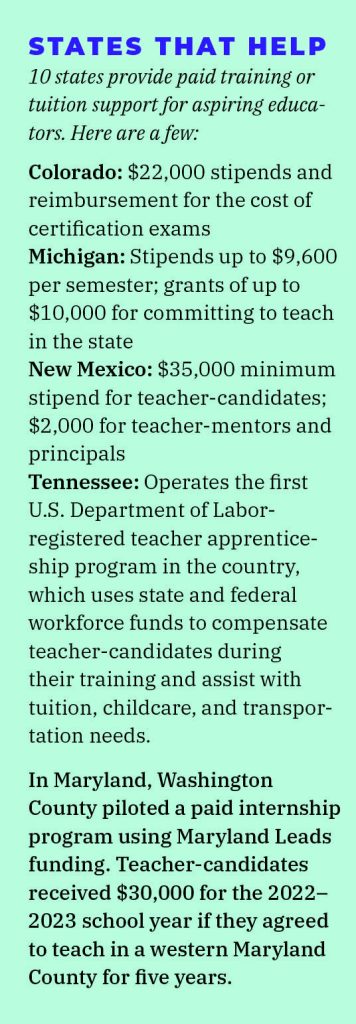Teaching must be attractive, accessible, respected
Aspiring Educators Deserve Paid Internships

The teacher shortage is affecting the whole of education—teaching and learning for students and educators, building quality relationships with students and parents, class sizes, opportunities for differentiation so that all students are reached, behavioral challenges, and more. Declines in teacher prep programs are a nationwide emergency.
MSEA believes that one answer to improving teacher recruitment is to pay aspiring educators for their internships. Too many aspiring educators are suffering from the expenses demanded by their internship—an essentially unpaid full-time job requiring gas for traveling to the placement school, a professional wardrobe, classroom materials, costly mandated exams, and the fee required for a mentor teacher. An internship almost always comes at the expense of the part- or full-time job that supports aspiring educators’ living expenses and tuition. It’s simply not sustainable.
It’s clear that these teacher-candidates desperately need support. The financial burden and emotional weight of these unpaid internships is causing aspiring educators to second-guess their dream of entering the profession. “With the requirements for graduation and paying for tests and certification with money I don’t have, I am slowly losing my love and motivation for teaching,” said Marieme Ndiaye, president of the Bowie State Aspiring Educators chapter.

“The consequences of not being paid include graduating with debt that a teacher’s salary will struggle to pay off, the inability to have a life outside of student teaching because you can’t afford to do anything else, and a lack of respect for your hard work,” said Mackenzie Werner, a student at Frostburg University.
Meaghan Doyle, a student at Towson University, started her teacher prep path early in the Teachers Academy of Maryland at her high school. Now she’s president of her Aspiring Educators chapter with a 3.4 GPA. Meaghan has worked her way through school—sometimes working 20–35 hours a week while managing five courses. Unfortunately, she found little support at school when she advocated for herself and other students in similar circumstances.

“I had to make the unfortunate and upsetting decision to leave the program and graduate without my certification. Having a paid internship would have allowed me to finish the program and receive my teaching certificate, but instead I must graduate without it,” Meaghan said.
“MSEA is behind these young educators who want desperately to contribute to their communities and show great maturity and motivation to complete their programs,” said MSEA President Cheryl Bost. “But the process is burdensome, financially draining, and causing another layer of stress for the aspiring educators who we urgently need to welcome to our classrooms. If we truly want to solve the teacher shortage, it’s time to take action on solvable problems like this one.”


